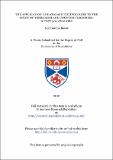The application of database technologies to the study of terrorism and counter-terrorism : a post 9/11 analysis
Abstract
Data and information of the highest quality are critical to understanding and
countering acts of terrorism. As a tool, database technologies are becoming integral
to the field of terrorism studies. The intelligence failings of September 11th 2001
illustrate the need for timely, relevant and accurate data, derived from a plethora of
complex intelligence sources.
This thesis will argue that, at least until 9/11, the academic study of terrorism and
counter-terrorism databases has been limited and that the subject lacks an overall
coherency and direction. The thesis asks: what is the quality and practical value of
database technologies in the field of terrorism and counter-terrorism post 9/11? The study will provide a cross-disciplinary approach, specifically from the disciplines of political science and computer science. It will present an understanding of the
conceptual, design, operation, strengths and weaknesses of terrorism and counterterrorism
databases. The ramifications of post 9/11 and its impact upon the intelligence community, and the areas of security, privacy and emerging technologies in data mining and terrorism informatics are assessed. This study will examine mainly open source information on terrorism and counterterrorism databases. The research methodology will be carried out using a series of case studies, from the ITERATE, RAND/MIPT, WITS, and GTDB data sets. Primary
sources, for example, codebooks, and secondary source materials such as Library of
Congress and GAO reports are used. A comparative sampling of relational databases
and terrorism data sets is undertaken.
The thesis will illustrate that with increased federal funding, new terrorism database technologies, post 9/11, operate under sophisticated schemata, requiring complex and systematic synthesis. In addition, issues of data sharing, fusion, interoperability and ethical concerns will be addressed.
Implications for future terrorism database technologies will be articulated. These
require rigorous design methodologies be adopted, while safeguarding ethical and
privacy concerns. The thesis provides a coherent systematic analysis of terrorism and
counter-terrorism databases, from what to date has been a disaggregated subject
field.
Type
Thesis, PhD Doctor of Philosophy
Collections
Items in the St Andrews Research Repository are protected by copyright, with all rights reserved, unless otherwise indicated.

